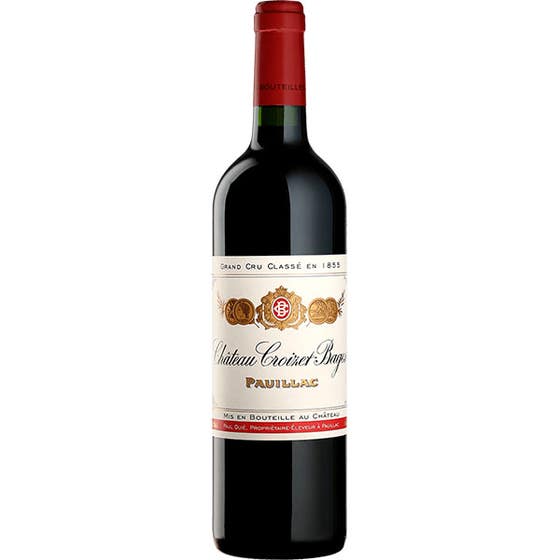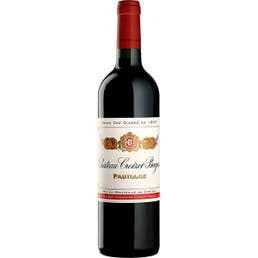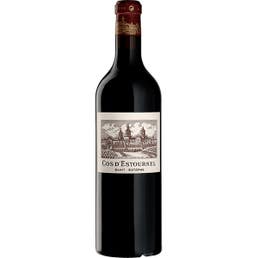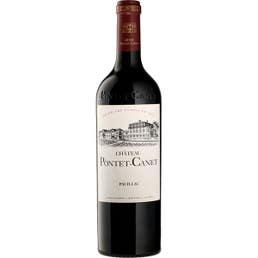Château Croizet-Bages 2013
Other Vintages We Offer:
• Domaine: Château Croizet-Bages
• Appellation: Pauillac
• Classification: Fifth Growth, 5ème Grand Cru Classé
• Origin: Left Bank, Bordeaux, France
Château Croizet-Bages is a producer that deviates from the typical powerfully robust style of most Pauillacs. For oenophiles who favor wines with restraint, subtlety and nuance – look no further than this Fifth Growth estate. Since the 1990s, a rise in quality has been readily apparent after an extensive replanting of the vineyards in the 1980s. The most recent vintage was ranked in the low 90s, an impressive feat for an estate that was considered an underperformer throughout the majority of the 20th Century. Without a doubt, exciting changes are happening at Château Croizet-Bages and we look forward to seeing its trajectory in the future.
Origins of the estate date back to the first half of the 18th Century, when the Croizet Brothers - who were members of the Bordeaux parliament - purchased several small parcels of vineyards to put together the estate in the commune of Bages. As was typical of the time, a portion of the estate’s namesake hails from their surname, and thus Croizet-Bages was born. Just a few years before the 1855 Classification, Julien Calve purchased the estate and changed its name to Calve-Croizet before changing it back just a few years later.
The château for the property was built away from the vines, in the heart of Pauillac. Though it was sold, the building still stands and is the Maison de la Culture in Pauillac. After Julien Calve owned the estate, an American Miner purchased the property. His name was Jean-Baptiste Monnot, the son of Jean-Ferreol Monnot who invented the Klaxon horn. In 1942, the estate was bought by the négociant, Paul Quié who still owns it to this day. For those unfamiliar, the Quié family is famous for owning a Second Growth property, Château Rauzan-Gassies. The Quié family has joined the ranks of the Barton and Borie family in being a part of a select group of individuals with the good fortune of owning two classified growth estates.
The vineyards of Château Croizet-Bages are unusual because they are planted in one contiguous plot. The 35-year-old vines consist of Cabernet Sauvignon, Merlot and Cabernet Franc that thrive in the sandy, graveled soil on the Bages plateau. The estate is not that far from Château Lynch Bages and Château Grand-Puy-Lacoste. The property harvests half of its crops by hand and the wines are vinified in traditional cement vats. Before 1994, the wines were all aged in neutral oak. As of now, the wine is aged in 25% new French oak barrels for about a year. This gives the grand vin a bit more structure, and some toasty, chocolatey qualities. In 2013, the Quié family began a massive renovation of the Croizet-Bages vineyards and the estate. Since these changes have been implemented, the resulting vintages have been improving in quality and receiving support among critics.
Because of the accessibility of these wines, they can be enjoyed younger with just a few hours of decanting. For select vintages, the wine shows beautifully with just a bit of bottle age.
Tasting Notes
"Deep fresh red, quite fragrant Cabernet fruit, fresh, still a little green but nice mid term." Steven Spurrier, Decanter Rating: 85 Drink: 2017-2025
''The 2013 Croizet Bages has a very conservative bouquet with light damp earthy tones but not much more. The palate is medium-bodied with more weight than I presupposed, the tannins light but fine with a delicate, easy-drinking finish that I have no complaints about. If your expectations are not excessively high, then you might not regret choosing this Pauillac to drink over the next 6-8 years.'' Neal Martin, The Wine Advocate (10/28/2016) Ratings: 85 Drink: 2016-2024
| LWIN | 1009150 |
|---|---|
| Stock Status | In Stock |
| Appellation | Pauillac |
| Vintage | 2013 |
| Brand | Chateau Croizet Bages |
| Shipping Weight | 3.000000 |








